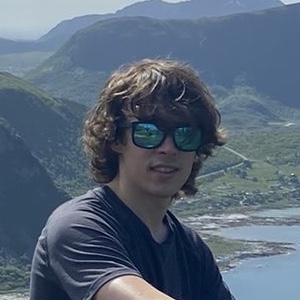Our testimonials: Ibon

Our testimonials: Ibon
Meet Ibon from Spain
Student of Marine Biology
"With its nice weather, friendly people and tasty food, Italy is a very welcoming country for international students!"

About myself
Ever since I was a little kid I have always loved nature, especially animals. Thanks to this I always knew that I wanted to become an environmental biologist, which I did at the University of Navarra in Spain. During the Bachelor I worked as a student intern in my faculty's Environmental biology department for 18 months. I also did a 1-month internship as a volunteer in NATUWA, a wildlife rescue center in Costa Rica with a friend. This proved to be an amazing experience that reinforced my desire to work in nature conservation, as well as travel as much as possible to visit new places!
During the last semester of the degree, I also did a 6-month Erasmus stay in Norway at the University of Tromso, where I wrote my Bachelor thesis on the ecology of a freshwater fish species. This Erasmus allowed me to study courses related to marine biology, which were very different from those in my own University and ultimately made me decide to pursue a career in Marine biology and choose this programme at the University of Padova.
After finishing my Master I would love to work as a researcher for the conservation and sustainable use of marine ecosystems. I would especially love to work with sharks, which are the topic of my current master's thesis. My wish is to work on something I can enjoy but which also helps preserve nature, so that in the future other people can keep appreciating all the amazing things that our planet has to offer just like I did -and still do!
In my spare time I like hiking and swimming, as well as reading, drawing and playing videogames when at home. I love travelling to new places and meeting people from different backgrounds: this is in part the reason why I decided to do the Erasmus and study for this master abroad. I also recently got a diving license which I hope to put to a good use!
Voices from the Campus: the Chioggia Campus
Chioggia is a calm and charming coastal city located at the southern entrance to the Lagoon of Venice. It has a population of 50000 people and is divided in two halves: the old city of Chioggia, where most of the historical buildings are, and Sottomarina, with more modern buildings and a beach. Both sides are connected by a bridge and travelling around them is easy and fast, especially if you have a bike.
The buildings of the University in Chioggia are Palazzo Grassi and the hydrobiological station. Both are located in the old city, 5 minutes away from each other. Palazzo Grassi is where the lessons take place and comprises several classrooms, a wet lab for some of the practical activities, a computer lab, study rooms, a conference hall, a courtyard and the Adriatic Zoology Museum. The hydrobiological station consists of multiple labs where several research groups conduct their experiments and is also the place for some of the practical activities, as well as where some students may end up conducting their master’s thesis. Some of the University activities are also conducted at the local fish market, one of the most important in the Adriatic.
Chioggia offers all the basic services that a student could need like several supermarkets and convenience stores, gyms, bars, different shops, etc. On Thursdays there is a market on the main street with many different products like food and clothes. However, if you cannot find something directly in Chioggia, the city is also well connected by bus to bigger cities like Padova and Venice, both around 1 hour away. In both Padova and Venice their respective train stations are located next to the bus stations, which makes it easier to travel around Italy or even abroad. There is also a direct bus connection from Chioggia to the Marco Polo airport in Venice.
Thanks to being a coastal city, the weather is relatively mild throughout the year, although it can be quite hot during summer and sometimes winds can get crazy. During the warm season the beach in Sottomarina can be used for many different activities like swimming or playing basketball. I assure you that the option to have fun with your friends at the beach can be quite a blessing during a stressful study period or a nice reward after finishing your exams!
What advice would you give to potential students thinking of studying abroad in Italy?
With its nice weather, friendly people and tasty food, Italy is a very welcoming country for international students! While not many people speak English, current technologies such as online translators are usually more than enough and, in my experience, most people are willing to make an effort to understand you. It is also not hard to learn the basic sentences for daily life and the University offers Italian courses that can be attended online. Learning Italian is by no means necessary, but this can be a good option.
Finding housing can be challenging, which is why I recommend starting as early as possible. If finding an accomodation from abroad proves impossible you can try staying in a hostel or Airbnb for a few weeks at the beginning while you look for a permanent house. You can also contact other students on social media to make the search easier. It seemd difficult at first but all my classmates were able to find a good option relatively fast so don’t give up!
A problem specific to Chioggia, especially Sottomarina, is that the city attracts a lot of tourism in Summer and some landlords may not be willing to extend the contract past May or might ask for much higher rents in Summer. Not all landlords do this, but it is essential that you ask because the academic course lasts until July. The good news is that, as this is not a problem until the very end of the course, you have plenty of time to look for a solution. Some students decided to move to nearby towns or stay for a few weeks in an Airbnb. The University also gave the option to international students without housing to do the exams online with the same conditions as face-to-face exams.
Finally, I just want to say that it is inevitable that you will face some unexpected problems during your time here. Just remember that you are not the only one who had to go through this. Don’t be shy, seek help from others and everything will be easier. Don’t let some minor problems (even if they may not seem minor at the moment) rob you of an amazing experience.
Lab activities & Field Trips - My Unipd experience
Depending on the courses you choose (especially in the second year) you may have different activities, but many are common to all students. Almost every course has a practical component, and sometimes also visits to many different interesting places like the saltmarshes around the lagoon, seafood factories or aquariums. These visits are very fun and a good change of pace, and apart from learning you may even want to keep some of these places in mind for potential internships!
Lab activities can be generally of two types: computer labs and wet labs. Computer labs can be very different depending on the course and teach many useful tools that can come in handy (for example: R course, modelling, using databases, sequencing data, etc). Wet labs are also quite varied, from genotyping to dissecting animals or algae or conducting behaviour experiments. Labs help add more variety to the courses and allow you to get some hand-on experience and apply the knowledge gained during the theoretical lessons. They are also a good way to interact with your classmates and know them better!
There is also a special course Practical marine biology, that consists of a whole week of different practical activities and ties together most of the courses of the year. This is a very fun week that allows you to see how many of the things you have been learning are applied during real research and a highlight of the master’s programme.
And, if you are interested, you also have the possibility to take an optional diving course. Although it is technically not part of the master’s programme, you can get a discount by doing it through the University so if you are interested this can be a very good opportunity. After all, no marine biologist is complete without a diving license!
MEET OUR TESTIMONIALS
Many students shared their experiences at the University of Padua.
Find out their stories!


